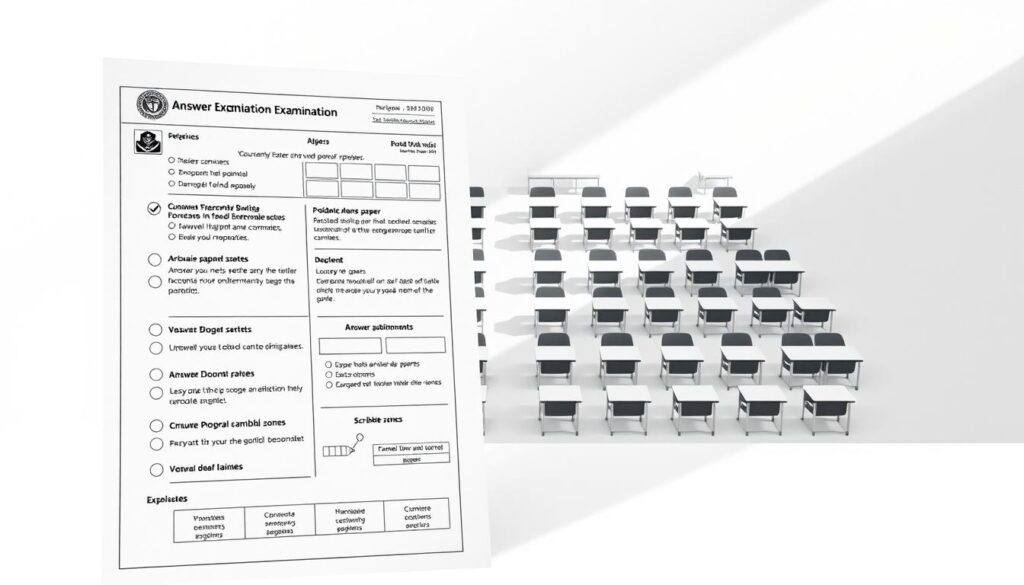Did you know that A-Level students who read examiners’ reports achieve significantly higher success rates, with many securing top grades like A*? Introduced in 1951, A-Level exams are a cornerstone of the UK education system, offering students a two-year specialized study in their chosen subjects. These qualifications are not only crucial for university admissions but also highly regarded internationally, making them a key stepping stone for future academic and career opportunities.
For students and parents, understanding the significance of A-Level exams is essential. These exams play a pivotal role in determining university placements through the UCAS points system. The structured, subject-focused curriculum allows students to delve deep into their areas of interest, preparing them for the challenges of higher education and beyond.
However, mastering A-Level exams is no small feat. Common challenges include misinterpreting questions, poor time management, and inadequate revision strategies. To overcome these hurdles, many students turn to private tutors for personalized guidance. Platforms like getutor.com.hk offer tailored support, helping students address their unique learning needs effectively.
Starting your revision early and staying consistent can make a significant difference. Research shows that students who begin revising at least three months before their exams experience a 40% reduction in stress and are better prepared. Additionally, practices like using past papers and creating structured study schedules can enhance performance and reduce anxiety.
For concerned parents, knowing where to find the right support is key. With the right strategies and guidance, students can navigate the challenges of A-Level exams with confidence. Stay tuned as we delve deeper into the strategies and insights to help your child succeed.
Key Takeaways
- Reading examiners’ reports can boost success rates and help students avoid common errors.
- Starting revision early and maintaining consistency are crucial for better preparation.
- Private tutoring can provide personalized support, improving academic performance.
- Using past papers and structured study schedules enhances exam readiness.
- Addressing common challenges like time management and question interpretation is vital for success.
Deep Dive into A-Level Exams: History and Global Recognition
Since their introduction in 1951, A-Level exams have become a cornerstone of the UK education system. They replaced the Higher School Certificate, offering students a specialized study path. Today, these qualifications are not only crucial for university admissions in the UK but also highly regarded internationally.
Historical Evolution and Reforms
Over the years, A-Level exams have undergone significant reforms to meet modern educational needs. One major change was the shift from modular to linear assessments. This reform aimed to enhance the depth of learning and reduce fragmentation. Additionally, the introduction of AS-levels in 1988 provided students with more flexibility in their study paths.
For instance, the pass rates for History A-Level exams have shown interesting trends. In 2021, the pass rate was 99.6%, dropping slightly to 98.7% in 2023. This data highlights the rigorous standards maintained by these exams.
International Usage and Recognition
A-Level qualifications are recognized globally, with institutions worldwide valuing their academic rigor. Cambridge International Education plays a key role in this recognition, with exam boards like Edexcel and AQA also contributing to their global acceptance.
Compared to qualifications like the Matura or IB, A-Levels are known for their subject depth. This makes them a preferred choice for students aiming for top universities. The structured curriculum prepares students for higher education challenges, making A-Levels a key asset for international students.
| Exam Board | Assessment Structure | Key Features |
|---|---|---|
| Cambridge | Linear assessments | Focus on essay-based questions |
| Edexcel | Modular and linear mix | Includes vocational options |
| AQA | Linear with varied components | Breadth and depth studies |
These reforms and global recognition underscore the enduring value of A-Level exams. They continue to be a trusted pathway for students seeking academic excellence and international opportunities.
Exam Structure and Key Components
Understanding the structure of A-Level exams is essential for effective preparation. These qualifications are designed to be studied over two years, typically divided into the AS year (first year) and the A2 year (second year). Students usually take 3-4 subjects, with AS-levels initially contributing to the overall mark before A2 exams complete the assessment.
Understanding the Two-Year Format
The two-year format allows students to explore their subjects in depth. The first year focuses on building foundational knowledge, while the second year emphasizes advanced concepts and critical thinking. This structure helps students gradually develop the skills needed for higher education.
Modular Changes and Assessment Techniques
Over the years, A-Level exams have evolved from modular to linear assessments. This shift aims to enhance the depth of learning and reduce fragmentation. Modular assessments allowed students to take exams at different points, while linear assessments require all exams to be taken at the end of the course. Additionally, the introduction of AS-levels in 1988 provided students with more flexibility in their study paths, although these are now decoupled from A-Levels in current systems.
| Exam Board | Assessment Structure | Key Features |
|---|---|---|
| Cambridge | Linear assessments | Focus on essay-based questions |
| Edexcel | Modular and linear mix | Includes vocational options |
| AQA | Linear with varied components | Breadth and depth studies |
Understanding the exam structure is crucial for effective study preparation. By familiarizing themselves with the components and assessment techniques, students can better navigate the challenges of A-Level exams and achieve their academic goals.

Mastering A-Level Exams: Effective Study Strategies
Developing a well-rounded study approach is key to excelling in A-Level exams. By combining efficient revision techniques with a deep understanding of the syllabus, students can optimize their learning process and achieve better grades.
Revision Techniques and Study Efficiency
To enhance study efficiency, focus on active learning methods like summarizing key concepts and teaching others. This approach can boost retention by 50% compared to passive studying. Incorporating techniques such as spaced repetition and mind maps can further improve memory retention by 40%. Regular breaks of 5 to 10 minutes after every 50 to 60 minutes of study can enhance cognitive performance by 30%.
Utilizing Past Papers and Syllabus Overviews
Working through past papers is essential for familiarizing oneself with exam styles and frequently asked questions. Reviewing the syllabus overview helps identify key topics, allowing focused revision. High-quality resources and digital tools can significantly enhance study effectiveness, while strategic planning enables targeting of weaker subjects.
| Study Technique | Effectiveness | Implementation |
|---|---|---|
| Active Learning | 50% retention improvement | Summarize and teach concepts |
| Spaced Repetition | 80% long-term retention | Regular review sessions |
| Regular Breaks | 30% cognitive improvement | 5-10 minutes after 50-60 minutes |
By implementing these strategies, students can create a structured study plan that promotes organization and reduces cramming. This balanced approach not only improves academic performance but also supports emotional well-being, crucial for exam success.
In-Depth Guide on Improving Subject Mastery
Mastering specific subjects is a cornerstone of A-Level success. By creating tailored study plans, students can address unique challenges and develop the skills needed for their chosen subjects. This approach not only enhances understanding but also aligns with future academic goals.
Tailored Study Plans for Different Subjects
Every subject presents distinct challenges. For example, science subjects like Chemistry require hands-on lab experience, while History demands strong analytical skills. Tailored study plans help students focus on these specific areas, ensuring they build a strong foundation.
Developing subject-specific skills is crucial. Mathematics requires problem-solving strategies, while English Literature demands critical analysis. By focusing on these unique demands, students can improve their performance and confidence.
For instance, a student aiming to study Medicine should emphasize Biology and Chemistry. Aligning their study plan with university requirements ensures they are well-prepared for future challenges. This targeted approach not only boosts grades but also supports long-term academic success.
Integrating feedback and regular practice is essential. Students should seek guidance from teachers or tutors to refine their skills. Setting realistic targets with expert help ensures study plans are effective and achievable.
By focusing on subject-specific challenges and developing unique skills, students can achieve their academic goals. Tailored study plans not only improve subject mastery but also enhance overall performance, leading to better grades and increased confidence.
Common Mistakes and Struggles in A-Level Exams
Many students face challenges during A-Level exams, often due to misunderstandings and poor time management. These issues can significantly impact results and overall score. Let’s explore these common pitfalls and how to avoid them.
Misinterpretation of Exam Questions
About 70% of students admit they don’t fully understand exam questions, leading to incorrect answers. This issue often arises from skimming rather than thoroughly reading. To address this, encourage your child to allocate time for careful reading and planning before answering. This approach can improve their ability to address each question accurately.
Time Management Pitfalls
Poor time management is another major challenge. Students often rush through questions, especially towards the end of the exam. This can lead to lower scores and increased stress. Teach your child to allocate time based on the question’s difficulty and marks. For example, spend more time on high-mark questions to maximize their score.
By addressing these common mistakes, students can better navigate exam challenges and achieve their academic goals. Proper preparation and strategies are key to success.
Expert and Peer Advice for Exam Success
Succeeding in A-Level exams often comes down to more than just textbooks and study guides. Real advice from those who have walked the path can make a significant difference. Let’s explore insights from successful students and experienced teachers to help your child excel.
Lessons from Successful Students
Students who have excelled in their A-Levels often highlight the importance of consistent revision and seeking support. For instance, a student from a top school in Hong Kong shared, “I dedicated two hours every evening to revision and used platforms like ‘Save My Exams’ for past papers. It made a huge difference!” This approach not only improved their performance but also reduced exam anxiety.
Testimonials and Insights from Teachers
Teachers play a crucial role in guiding students. An Edexcel expert remarked, “Understanding the exam format and practicing under timed conditions is key. Students who simulate real exam conditions tend to perform better.” Such insights help students prepare more effectively and build confidence.
By combining these strategies, your child can approach their A-Levels with confidence and achieve their academic goals. Remember, success is a combination of hard work, smart strategies, and the right support system.

Leveraging Online Resources and Study Tools
With the rise of digital learning, students now have access to a wealth of online resources and study tools that can significantly enhance their A-Level preparation. These tools not only make studying more efficient but also provide personalized support to meet individual learning needs.
Comprehensive Study Guides and Websites
There are numerous websites dedicated to providing comprehensive study guides and revision materials. Platforms like Khan Academy and Coursera offer free courses and resources that cover a wide range of subjects. These resources are often vetted by top exam boards, ensuring their quality and relevance.
For instance, websites like MathPlanet specialize in Mathematics, offering detailed guides and practice exercises. Similarly, PhET Simulations provides interactive science lessons that make complex concepts easier to understand. These subject-specific tools are invaluable for targeted revision.
Digital Notes and Revision Apps
Digital note-taking apps like Microsoft OneNote and Evernote allow students to organize their notes efficiently. These apps enable easy retrieval and sorting of notes, making study sessions more productive. Additionally, revision apps such as Quizlet and Anki use spaced repetition to aid long-term memory retention, which is particularly effective for subjects like History and Languages.
| Platform | Features | Benefits |
|---|---|---|
| Khan Academy | Video lectures, practice exercises | Covers a wide range of subjects, free access |
| Coursera | Structured courses, expert instruction | Offers certificates upon completion |
| MathPlanet | Subject-specific guides, interactive exercises | Enhances problem-solving skills |
| PhET Simulations | Interactive simulations | Makes complex science concepts engaging |
Structured Online Courses and Learning Centers
Structured online courses can supplement traditional learning, offering a flexible way to cover syllabus content. Many local learning centers now provide access to these digital resources, making high-quality education more accessible. These courses often include video lectures, practice papers, and interactive activities designed to reinforce learning.
Furthermore, platforms like Udemy and Skillshare offer paid courses with lifetime access, allowing students to revisit material as needed. This flexibility is particularly beneficial for students who need to balance their studies with other commitments.
By leveraging these online resources and study tools, students can create an efficient and effective study routine. Whether through comprehensive guides, digital notes, or structured courses, these tools provide the support needed to excel in A-Level exams and beyond.
Time Management and Revision Techniques
Planning an effective study schedule is crucial for success in A-Level exams. A well-structured schedule helps balance revision, practice, and rest, ensuring optimal preparation. Let’s explore practical strategies to create a study plan that works for you.
Planning Your Study Schedule
To begin, map out your study schedule based on the syllabus. Identify key topics and allocate time wisely. For instance, dedicate more time to challenging subjects and less to areas you’ve mastered. Setting measurable goals, such as covering two topics per week, helps track progress and stay motivated.
| Activity | Time Allocation | Frequency |
|---|---|---|
| Revision | 4-5 hours/day | Daily |
| Past Papers | 2 hours/day | 3 times a week |
| Breaks | 5-10 minutes | Every 50-60 minutes |
Incorporate the Pomodoro Technique: 25 minutes of focused study followed by a 5-minute break. This method boosts concentration and retention. Regular breaks prevent mental fatigue, ensuring sustained productivity.
Balance your time between revision, past papers, and rest. Allocate specific days for each activity to maintain consistency. For example, dedicate weekends to practicing past papers under timed conditions. This approach builds time management skills and exam readiness.
Reviewing the syllabus in manageable segments can boost confidence. Break it into smaller sections and focus on one area at a time. This strategy reduces overwhelm and allows for deeper understanding.
Finally, prioritize sleep and maintain a healthy lifestyle. Aim for 7-8 hours of sleep daily to support cognitive function. Regular exercise and a balanced diet also enhance energy levels and focus.
By implementing these strategies, you can create a structured study plan that promotes organization and reduces stress. Remember, consistent effort and smart planning are key to achieving your academic goals.

Benefits of a level exams Private Tutor & Free Matching at getutor.com.hk
Private tutoring has become an essential tool for students aiming to excel in A-Level exams. With the right guidance, students can overcome challenges and achieve their academic goals. Top exam boards like AQA and Edexcel set high standards, making personalized support crucial for success.
Personalized Guidance and Exam Strategies
A private tutor offers one-on-one attention, tailoring strategies to each student’s needs. This personalized approach helps students grasp complex topics and improve their exam techniques. For instance, a parent shared, “My child’s grades improved significantly after working with a tutor from getutor.com.hk. The structured approach made all the difference.”
The free matching service at getutor.com.hk connects students with experienced tutors, ensuring a perfect fit. This service has led to better exam results and increased university offers, as students receive expert guidance aligned with their goals.
| Tutoring Service | Features | Benefits |
|---|---|---|
| Private Tutoring | One-on-one sessions, tailored strategies | Improved understanding, higher grades |
| Free Matching | Expert matching based on needs | Optimal tutor-student fit |
| Exam Preparation | Structured study plans, practice papers | Enhanced exam readiness |
Testimonials highlight the effectiveness of tailored learning support. Students report improved confidence and better academic performance. By leveraging these resources, parents can provide their children with the tools needed to succeed in A-Level exams and beyond.
Essential Tips to Boost Grades and Exam Confidence
Academic success often hinges on more than just studying. It’s about refining strategies, understanding strengths, and addressing weaknesses. By integrating feedback and analyzing test performance, students can take significant steps toward improving their grades and building confidence.
Integrating Feedback and Test Performance Analysis
One of the most powerful tools for academic growth is detailed feedback. Whether it’s from teachers or exam reports, understanding where you went wrong—and right—can transform your study approach. For instance, students who regularly analyze their test results often see a noticeable improvement in their scores over time.
- Start by reviewing past papers to identify recurring mistakes. This helps in focusing your revision on weak areas.
- Analyze your scores to understand which subjects or topics need more attention.
- Use this data to adjust your study schedule, dedicating more time to challenging topics.
- Seek feedback from teachers or tutors to refine your study methods and test-taking strategies.
By systematically reviewing performance and incorporating feedback, students can meet university entry requirements and subject-specific standards more effectively. Remember, every step forward, no matter how small, brings you closer to your academic goals.

Conclusion
As we conclude, it’s clear that A-Level success requires a blend of strategy, support, and dedication. Understanding the exam structure and leveraging resources like past papers are vital for long-term success. Private tutoring offers personalized guidance, helping students overcome challenges and achieve their academic goals.
For parents, taking action by using free matching services at getutor.com.hk can provide the expert support needed for your child’s success. Remember, every student can improve their results with the right strategies and support.
Stay confident and motivated. With structured plans and expert help, your child can excel in their A-Level journey and secure their future in higher education.
FAQ
What is the structure of A-Level exams?
A-Level exams are typically divided into modules, with assessments at the end of each year. The final grade is based on performance in both years, including exams and coursework.
How can I improve my grades in A-Level subjects?
Focus on understanding the syllabus, practice past papers, and seek guidance from teachers. Regular revision and effective time management are key to success.
What resources are best for A-Level preparation?
Use official resources like Edexcel and AQA study guides. Past papers and revision notes from trusted sources can also enhance your preparation.
How do I avoid common mistakes in A-Level exams?
Read questions carefully, manage your time well, and review your answers. Practice with past papers to identify and correct common errors.
Can I take A-Level exams outside the UK?
Yes, many international centers offer A-Level exams. Check with your local exam center for details on registration and requirements.
How important are A-Level grades for university entry?
A-Level grades are crucial for university admission. Higher grades can open more opportunities and scholarships.
What subjects are most popular at A-Level?
Popular subjects include Mathematics, Sciences, English Literature, Psychology, and Business Studies. Choose subjects that align with your career goals.
How can I stay motivated during A-Level studies?
Set clear goals, create a study plan, and seek support from teachers or tutors. Celebrate small achievements to stay motivated.
What is the difference between A-Level and GCSE exams?
A-Level exams are more advanced, focusing on in-depth knowledge and critical thinking. GCSEs are taken at a younger age and cover a broader range of subjects.
Can I retake A-Level exams to improve my grades?
Yes, retakes are possible. Plan carefully with your teachers to ensure you meet deadlines and improve your performance.


